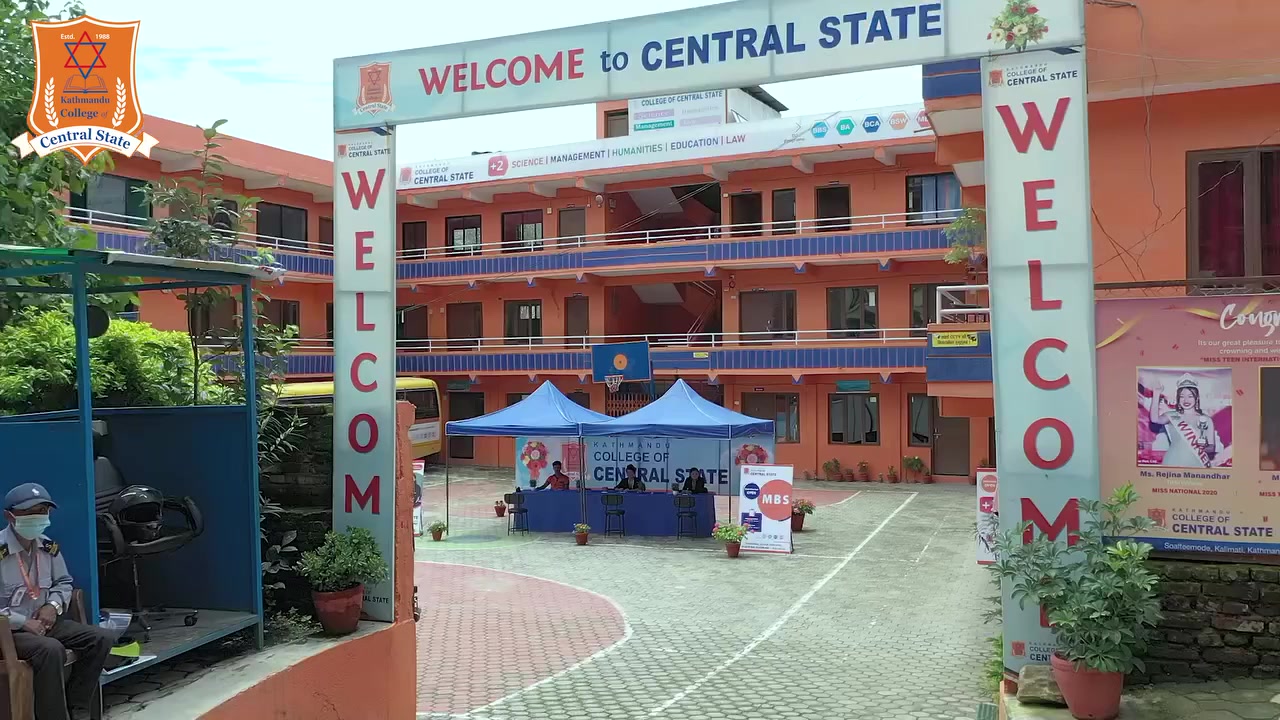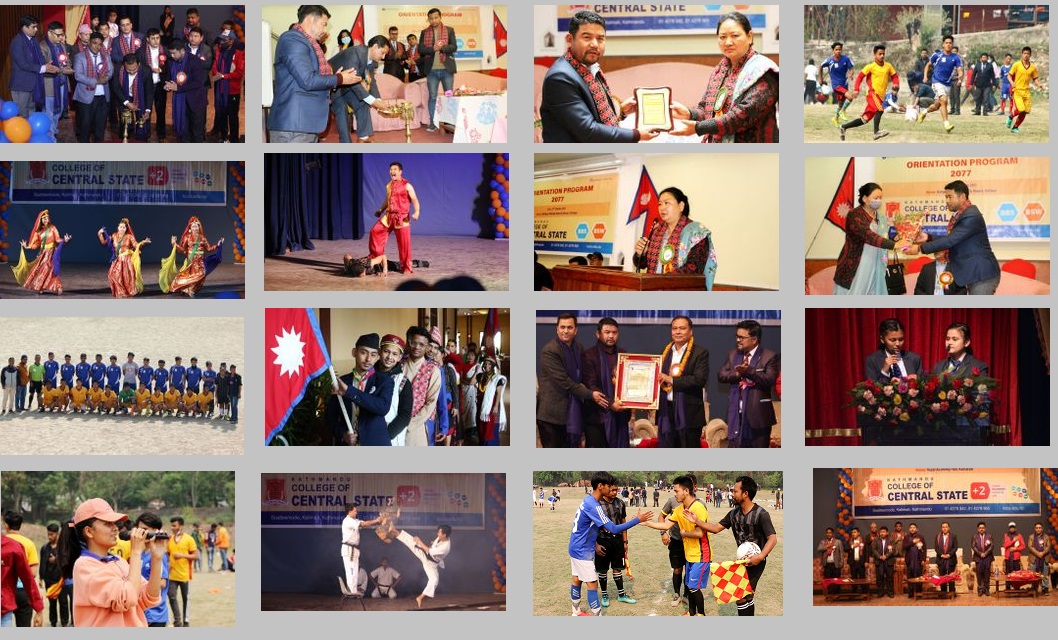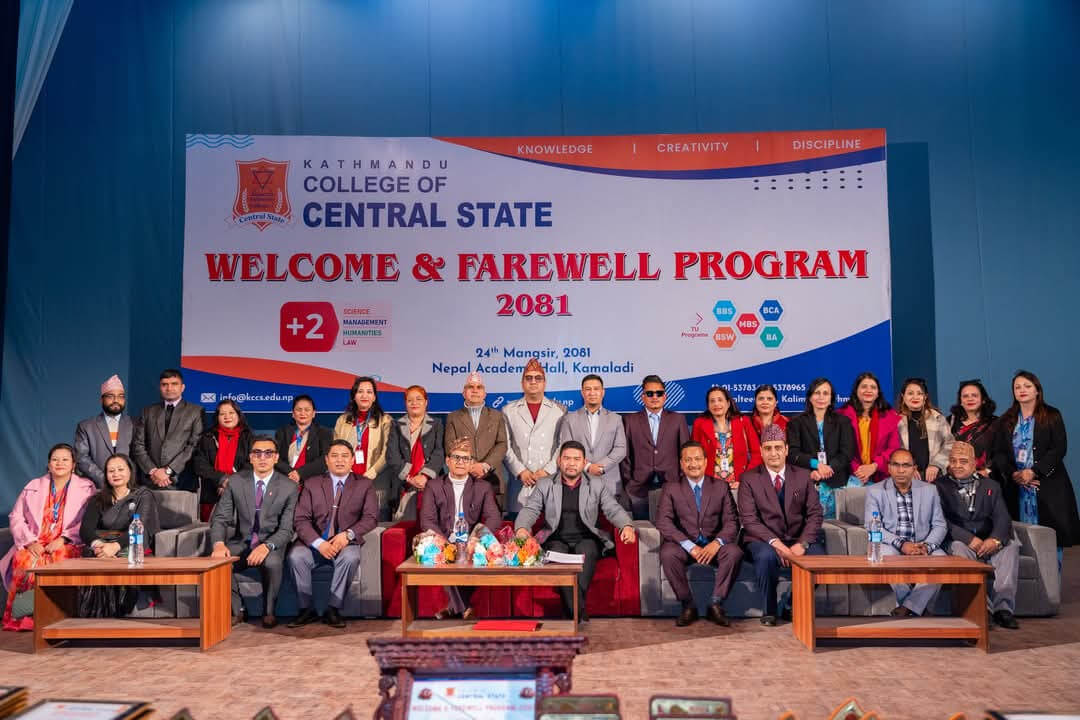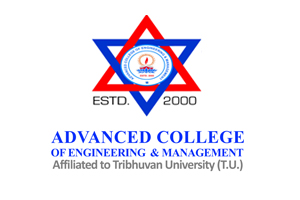Overview
Kathmandu College of Central State (KCCS) is a longstanding institution located in Soalteemode, Kalimati, Kathmandu, Nepal, affiliated with Tribhuvan University (TU) for bachelor’s and master’s degrees and aligned with the National Examinations Board (NEB) for Ten Plus Two (+2) programs. Within a single academic home, students can pursue +2 tracks in Science, Management, Humanities, and Law, and continue to undergraduate and postgraduate studies such as BASW, BCA, BBS, and MBS.

Quick Highlights
-
Established: 1988 AD
-
Location: Kathmandu, Nepal
-
Affiliations: Tribhuvan University (Bachelor’s and Master’s); National Examinations Board (10+2)
-
Programs: +2 Science | +2 Management | +2 Humanities | +2 Law | BASW | BCA | BBS | MBS
-
Academic Calendar: TU semesters or annual examinations, and NEB yearly assessments
-
Instruction: Classroom teaching with labs, fieldwork, tutorials, seminars, and guided research as per program needs
-
Student Support: Counseling, mentorship, career guidance, and structured internal assessments
-
Facilities: Library, reading rooms, computer labs, science labs, hotel management practical set-ups (as applicable), e-learning support, and activity spaces
-
Scholarships: Merit-based, need-sensitive, and policy-linked quotas in line with TU/NEB guidelines
Academic Programs Offered
Ten Plus Two (+2) Programs under NEB
KCCS runs four NEB-recognized tracks. Each stream follows NEB curricula and assessment policies and readies students for university pathways in Nepal and abroad.
+2 Science
-
Focus: Physics, Chemistry, Biology/Mathematics with laboratory practicals and foundational quantitative skills.
-
Who it suits: Learners aiming for medicine, engineering, IT, or pure/applied sciences.
-
Learning mode: Theory classes, lab work, problem-solving sessions, and periodic tests aligned with NEB exam timelines.
-
Progression: BSc, BE/Engineering (as per separate entrance), BCA, public health, pharmacy, or other STEM fields.
+2 Management
-
Focus: Accountancy, Economics, Business Studies, and optional subjects such as Hotel Management or Computer Science.
-
Who it suits: Students interested in business, banking, hospitality, entrepreneurship, and commerce.
-
Learning mode: Case discussions, numerical practice, and project-based tasks with internal evaluations.
-
Progression: BBS, BBA (separate entrance at many colleges), BHM, or related degrees.
+2 Humanities
-
Focus: Social sciences, literature, psychology, sociology, and communication subjects that strengthen writing, analysis, and civic understanding.
-
Who it suits: Future social workers, educators, writers, media professionals, and policy researchers.
-
Progression: BA, BASW, journalism, development studies, or education.
+2 Law
-
Focus: Foundations in jurisprudence, Nepalese legal system, constitutional principles, criminal law basics, procedural law, and legal drafting.
-
Learning mode: Classroom theory with exposure such as model hearings, guided visits, and document analysis.
-
Progression: LLB (separate entrance as applicable), public administration, BA, or allied fields.
Bachelor’s Programs under Tribhuvan University
All bachelor’s programs follow TU curricula, internal assessments, and final examinations per faculty rules.
BASW (Bachelor of Arts in Social Work)
-
Aim: Generalist social work preparation with classroom theory and structured fieldwork.
-
Coursework: Social work principles, human behavior, community studies, research methods, counseling basics, and academic writing.
-
Fieldwork: Placements with social organizations, urban/rural camps, and supervised reports.
-
Career paths: Community development, NGOs, social services in hospitals/schools/municipal units, or postgraduate study in social work/public health/development.
BCA (Bachelor of Computer Application)
-
Duration/Structure: Four years, eight semesters under TU.
-
Curricular coverage: Programming (C/Java and others), data structures, web technologies, databases, computer networks, operating systems, software engineering practices, and project work.
-
Learning mode: Coding labs, projects (I, II, III), seminars, and internship (TU guideline).
-
Career paths: Entry-level software development, web/mobile applications, database support, QA/testing, network support, and pathways to advanced study.
BBS (Bachelor of Business Studies)
-
Duration/Structure: Four-year program under TU Faculty of Management, with an annual exam system.
-
Curricular coverage: Accountancy, finance, marketing, HR, business law, economics, research basics, and entrepreneurship subjects in later years.
-
Learning mode: Numerical practice, case write-ups, project presentations, and internal tests as per TU rules.
-
Career paths: Banking and finance, corporate roles, account support, sales and marketing, operations, and entry to MBS or other postgraduate management degrees.
Master’s Program under Tribhuvan University
MBS (Master of Business Studies)
-
Structure: TU conducts MBS in four semesters.
-
Coverage: Core management fields (marketing, finance, HR, operations), managerial economics, research methodology, strategic management, and area electives.
-
Academic activities: Term papers, seminars, research assignments, and a capstone/dissertation or project as guided by TU.
-
Outcomes: Readiness for mid-level management roles, teaching (with required credentials), public service exams, consulting support roles, or further research.
Admission Process
KCCS follows TU and NEB entry rules. Requirements can change by year, so applicants should rely on the latest notices issued by the college and respective authorities.
+2 Programs (NEB)
-
Eligibility: SEE or equivalent as per NEB policy for the intended stream. Some streams set subject-wise thresholds (for example, Science may require stronger GPAs in Math/Science).
-
Process:
-
Application form and document screening
-
Placement/interaction if the stream specifies
-
Final selection as per NEB/college policy
-
-
Documents (typical): SEE mark sheet and certificate, character certificate, photos, and ID/citizenship copy of the guardian/student as applicable.
Bachelor’s Programs (TU)
-
General eligibility: 10+2 or equivalent from a recognized board with minimum grades per TU faculty rules.
-
Program-specific points:
-
BCA: TU conducts a central entrance test. Students apply through the TU portal and select the college during counseling/seat allocation, subject to merit and seat availability.
-
BBS/BASW: Minimum grade requirements (often D+ or aggregate thresholds) as per the respective faculties. Some departments may hold interviews/interaction.
-
-
Documents (typical): Grade 12 transcript and certificate, character certificate, provisional/migration certificates (if shifting boards), and citizenship copy.
MBS (TU)
-
Eligibility: Bachelor’s degree in management (BBS) or a bachelor’s in another discipline recognized by TU (as per TU’s MBS entry rules).
-
Process:
-
Application and document screening
-
Additional steps if TU/college prescribes (e.g., entrance, interview)
-
-
Documents (typical): Bachelor’s transcript and certificate, character/provisional/migration certificates, and ID.
Important: Seats, quotas, and timing are published annually. Always check the latest KCCS and TU/NEB notices before applying.
Teaching Faculty and Learning Methodology
-
Faculty profile: Subject-qualified teachers with experience in classroom delivery, labs, project supervision, and exam preparation aligned with TU/NEB patterns.
-
Classroom model: Lectures with tutorials, lab practicals (where applicable), presentations, and guided assignments.
-
Assessment mix: Internal tests, practicals, viva, project reports, attendance and participation (where relevant), and the final board/university examinations.
-
Academic supports: Orientation on exam patterns, writing clinics for report/term paper preparation, research guidance in senior semesters, and mentorship hours.
Infrastructure and Learning Facilities
-
Library and reading rooms: Texts, reference materials, past papers, journals (as available), and quiet study spaces.
-
Computer labs: Programming, networking basics, web development practice, database work, and project deployment support.
-
Science labs: Physics, Chemistry, and Biology practicals aligned with NEB and TU requirements.
-
Hotel management practical area (as offered in relevant courses): Food production and service basics for students choosing hospitality option papers.
-
E-learning support: Digital resources, projector-ready classrooms, and guided use of standard productivity tools for assignments.
-
Student services: Counseling, orientation for new entrants, health and safety awareness, and exam registration support.
-
Campus utilities: Wi-Fi access (policy-based), cafeteria, activity venues, and transport options where available.
Student Life and Campus Experience

-
Academic culture: Punctual classes, test cycles, assignment schedules, and attendance tracking in line with academic policies.
-
Mentoring: Teacher guidance during internal assessments, project work, and exam preparation weeks.
-
Peer learning: Study circles, coding practice groups, presentation clubs, and mock tests prior to board/university exams.
-
Community ethos: Respectful conduct, inclusion across streams, and support for learners transitioning from school to college level.
Extracurricular Activities (ECA)
-
Clubs and forums: IT and coding groups, social work forums, debate and literature circles, and sports units.
-
Exposure: Field visits (BASW and Humanities), model interactions for Law studies, and seminars/guest talks connected to course content.
-
Events: Quizzes, presentations, cultural days, and volunteering during community programs or awareness drives.
Scholarships and Financial Support
KCCS follows merit and policy frameworks that align with TU/NEB and national rules.
-
Merit-based support: For high academic performers as per published criteria (entrance score/board exam scores/internal performance, depending on level).
-
Need-sensitive consideration: Limited seats based on documentation and committee review.
-
Government/Policy quotas: Seats/fee considerations guided by national rules and relevant boards/universities when such provisions apply.
-
Continuity rules: Many awards require maintaining attendance, discipline, and academic standing.
-
How to apply: Submit a scholarship form with supporting documents within the deadline stated in the announcement; follow any interview/verification steps.
Achievements and Institutional Milestones
-
Years of service: Operating since 1988, with consistent NEB and TU cohorts across +2 and higher education.
-
Program growth: Addition of IT and management pathways alongside social sciences, enabling graduates to move from +2 to master’s within the same academic environment.
-
Graduate footprint: Alumni engaged in business, public service (subject to PSC criteria), development organizations, education, and entry-level tech roles, reflecting the range of programs offered.
-
Quality systems: Periodic internal tests and project reviews that mirror board/university expectations; exam-form guidance to reduce administrative errors.
Why Choose This Institution?
-
Single-campus pathway: From +2 to bachelor’s and MBS, learners can plan multi-year study paths without changing institutions.
-
Recognized affiliations: TU degrees and NEB +2 credentials hold established standing in Nepal’s higher education system.
-
Range of options: Science, Management, Humanities, and Law at +2, plus BASW, BCA, BBS, and MBS at higher levels.
-
Balanced learning: Classroom theory, lab work, field placements, and projects aligned to each discipline’s needs.
-
Academic support: Orientation, mentorship, and structured internal assessments that help students understand university/board expectations.
-
Skill growth: Writing practice, presentations, coding projects, community exposure, and research assignments build discipline-specific habits.
-
Practical settings: Science and computer labs, and hospitality practicals for students who select those optional papers.
-
Location benefits: Kathmandu access to public institutions, firms, courts, NGOs/INGOs, and tech/start-up ecosystems for exposure and internships (as available and permitted).
Conclusion
Kathmandu College of Central offers a steady academic route for students who want recognized +2, bachelor’s, and MBS options under Nepal’s mainstream boards and universities. Clear entry rules, structured teaching, and accessible facilities support learning from school-leaving to postgraduate level. Applicants should review the latest notices for seats, scholarships, and entrance timelines, then choose the stream or program that matches their goals and preparedness.
Contact Kathmandu College of Central State's administrative office for detailed information on the course, admissions, location, fees, scholarships, facilities, counseling, or eligibility.
Contact Details
Kathmandu College of Central State
Soalteemode, Kalimati, Kathmandu
Email Address: info@kccs.edu.np
Phone Number: +977-1-5378342, +977-1-5378965
Website: https://kccs.edu.np
Location: Soalteemode, Kalimati, Kathmandu


















